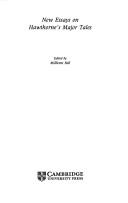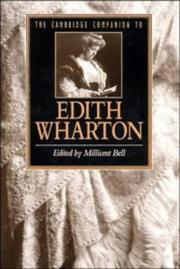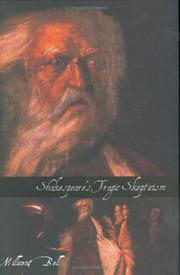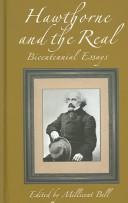| Listing 1 - 10 of 14 | << page >> |
Sort by
|
Book
ISBN: 067455762X 9780674557628 Year: 1991 Publisher: Cambridge, Mass. London Harvard University Press
Abstract | Keywords | Export | Availability | Bookmark
 Loading...
Loading...Choose an application
- Reference Manager
- EndNote
- RefWorks (Direct export to RefWorks)
Henry James rebelled intuitively against the tyranny and banality of plots. Believing a life to have many potential paths and a self to hold many destinies, he hung the evocative shadow of what might have been over much of what he wrote. Yet James also realized that no life can be lived--and no story written--except by submission to some outcome. The limiting conventions of society and literature are, he found, almost inescapable. In a major, comprehensive new study of James's work, Millicent Bell explores this oscillation between hope and fatalism, indeterminacy and form, and uncertainty and meaning. In the process Bell provides fresh insight into how we read and interpret fiction. Bell demonstrates how James's texts steadfastly, almost perversely at times, preserve a sense of alternative possibilities. James involves his characters in overlapping scenarios drawn from folklore, drama, literature, or naturalist formula. The reader engages, with the hero or heroine, in imagining many plots other than the one that finally--and often ambiguously--emerges. The story arouses expectations, proposes courses, then cancels them successively. In complicity with author and character, the reader crafts the story in an adventure of constant revision and anticipation. Literary meaning becomes an experience as well as a goal. In the end, revelations and resolutions, even if unclear or partial, assume an altered significance in light of the earlier imaginings. Not surprisingly, James's deepest sympathies lay with those characters who resisted entrapment by cultural expectations--his idealistic free spirits like Isabel, his marriage renouncers like Fleda Vetch, his largely silent and detached witnesses to life like Strether and the generous Maisie. They are frequently the victims of callous manipulators who box them into oppressive roles or who literally plot against them. By looking closely at James's critiques of the clever categorical mind and at his loving and complex portraits of characters of unfulfilled potentiality, Bell celebrates the paradoxes of James's story-denying fiction. In extended analyses of Daisy Miller, Washington Square, The Portrait of a Lady; The Bostonians, The Princess Casamassima, The Aspern Papers, The Spoils of Poynton, The Turn of the Screw, What Maisie Knew, The Beast in the Jungle, The Jolly Corner, The Wings of the Dove, and The Ambassadors, Bell relates James's work to influential movements of the day, notably impressionism and naturalism. She examines the influence of Hawthorne, Emerson, Flaubert, Balzac, and Zola on James at various periods throughout his career. Drawing on rich traditions of criticism and on stimulating recent theories, Bell forges a critical approach both accessible and profound for this elegant reading of one of the greatest writers of this or any time.

ISBN: 0521428688 Year: 1993 Publisher: Cambridge : Cambridge University Press,
Abstract | Keywords | Export | Availability | Bookmark
 Loading...
Loading...Choose an application
- Reference Manager
- EndNote
- RefWorks (Direct export to RefWorks)
Hawthorne, Nathaniel --- Historical fiction, American --- History and criticism. --- History and criticism --- Hawthorne, Nathaniel, --- Gotorn, Nataniėlʹ, --- Hotorn, Natanijel, --- Huo-sang, --- Huo-sang, Na-sa-ni-erh, --- Hothorna, Netheniyala, --- Готорн, Натаниэль, --- האטארן, נאטאניעל, --- Huosang, --- Huosang, Nasa'nier, --- Nasa'nier Huosang, --- 霍桑, --- 霍桑, 纳撒尼尔, --- 纳撒尼尔 霍桑, --- Criticism and interpretation. --- New England --- In literature. --- Hās̲ūran, Nātānīl, --- Hās̲ūrn, Nātānīl, --- هاثورن، ناتانيل --- Gotorn, Nataniėlʹ --- Hotorn, Natanijel --- Huo-sang --- Huo-sang, Na-sa-ni-erh --- Hothorna, Netheniyala --- Готорн, Натаниэль --- Huosang --- Huosang, Nasa'nier --- Nasa'nier Huosang --- Hās̲ūran, Nātānīl --- Hās̲ūrn, Nātānīl --- Hawthorne, Nathaniel (1804-1864) --- Critique et interprétation
Book
ISBN: 0674557638 Year: 1991 Publisher: Cambridge (MA) : Harvard University Press,
Abstract | Keywords | Export | Availability | Bookmark
 Loading...
Loading...Choose an application
- Reference Manager
- EndNote
- RefWorks (Direct export to RefWorks)
Henry James rebelled intuitively against the tyranny and banality of plots. Believing a life to have many potential paths and a self to hold many destinies, he hung the evocative shadow of “what might have been” over much of what he wrote. Yet James also realized that no life can be lived—and no story written—except by submission to some outcome. The limiting conventions of society and literature are, he found, almost inescapable. In a major, comprehensive new study of James’s work, Millicent Bell explores this oscillation between hope and fatalism, indeterminacy and form, and uncertainty and meaning. In the process Bell provides fresh insight into how we read and interpret fiction.Bell demonstrates how James’s texts steadfastly, almost perversely at times, preserve a sense of alternative possibilities. James involves his characters in overlapping scenarios drawn from folklore, drama, literature, or naturalist formula. The reader engages, with the hero or heroine, in imagining many plots other than the one that finally—and often ambiguously—emerges. The story arouses expectations, proposes courses, then cancels them successively. In complicity with author and character, the reader crafts the story in an adventure of constant revision and anticipation. Literary meaning becomes an experience as well as a goal. In the end, revelations and resolutions, even if unclear or partial, assume an altered significance in light of the earlier imaginings.Not surprisingly, James’s deepest sympathies lay with those characters who resisted entrapment by cultural expectations—his idealistic free spirits like Isabel, his marriage renouncers like Fleda Vetch, his largely silent and detached witnesses to life like Strether and the generous Maisie. They are frequently the victims of callous manipulators who box them into oppressive roles or who literally “plot against” them. By looking closely at James’s critiques of the “clever” categorical mind and at his loving and complex portraits of characters of unfulfilled potentiality, Bell celebrates the paradoxes of James’s story-denying fiction.In extended analyses of “Daisy Miller,” Washington Square, The Portrait of a Lady; The Bostonians, The Princess Casamassima, “The Aspern Papers,” The Spoils of Poynton, “The Turn of the Screw,” What Maisie Knew, “The Beast in the Jungle,” “The Jolly Corner,” The Wings of the Dove, and The Ambassadors, Bell relates James’s work to influential movements of the day, notably impressionism and naturalism. She examines the influence of Hawthorne, Emerson, Flaubert, Balzac, and Zola on James at various periods throughout his career. Drawing on rich traditions of criticism and on stimulating recent theories, Bell forges a critical approach both accessible and profound for this elegant reading of one of the greatest writers of this or any time.RELATED LINKS
James, Henry, --- James, Henry --- Criticism and interpretation --- Critique et interprétation --- Critique et interprétation.

ISBN: 0521485134 9780521485135 0521453585 1139000209 1139815350 9781139000208 9780521453585 Year: 1995 Publisher: Cambridge Cambridge University Press
Abstract | Keywords | Export | Availability | Bookmark
 Loading...
Loading...Choose an application
- Reference Manager
- EndNote
- RefWorks (Direct export to RefWorks)
The Cambridge Companion to Edith Wharton offers a series of fresh examinations of Edith Wharton's fiction written both to meet the interest of the student or general reader who encounters this major American writer for the first time and to be valuable to advanced scholars looking for new insights into her creative achievement. The essays cover Wharton's most important novels as well as some of her shorter fiction, and utilise both traditional and innovative critical techniques, applying the perspectives of literary history, feminist theory, psychology or biography, sociology or anthropology, or social history. The Introduction supplies a valuable review of the history of Wharton criticism which shows how her writing has provoked varying responses from its first publication, and how current interests have emerged from earlier ones. A detailed chronology of Wharton's life and publications and a useful bibliography are also provided.
Wharton, Edith --- Wharton, Edith, --- Women and literature --- History --- Olivieri, David, --- Wharton, Edith Newbold Jones, --- Уортон, Эдит, --- Gouorton, Intith, --- Criticism and interpretation. --- Handbooks, manuals, etc. --- Femmes et littérature --- Histoire --- Wharton, Edith Newbold --- Criticism and interpretation --- English --- American Literature --- Languages & Literatures --- Jones, Edith Newbold --- Wharton, Edith (1862-1937) --- Critique et interprétation
Book
ISBN: 0316088285 9780316088282 Year: 1979 Publisher: Boston Little, Brown
Abstract | Keywords | Export | Availability | Bookmark
 Loading...
Loading...Choose an application
- Reference Manager
- EndNote
- RefWorks (Direct export to RefWorks)
From newspaper reporter and advertising copywriter to best- selling novelist, he embodied the American dream of his time.
Authors, American --- Ecrivains américains --- Biography --- Biographies --- Marquand, John P. --- Markvėnd, D. F. --- Markvėnd, Dzhon Filipps, --- Marquand, J. P. --- Marquand, John Phillips, --- Марквэнд, Д. Ф. --- Марквэнд, Джон Филиппс,

ISBN: 1281740772 9786611740771 0300127200 9780300127201 9781281740779 0300092555 9780300092554 Year: 2002 Publisher: New Haven
Abstract | Keywords | Export | Availability | Bookmark
 Loading...
Loading...Choose an application
- Reference Manager
- EndNote
- RefWorks (Direct export to RefWorks)
Readers of Shakespeare's greatest tragedies have long noted the absence of readily explainable motivations for some of Shakespeare's greatest characters: why does Hamlet delay his revenge for so long? Why does King Lear choose to renounce his power? Why is Othello so vulnerable to Iago's malice? But while many critics have chosen to overlook these omissions or explain them away, Millicent Bell demonstrates that they are essential elements of Shakespeare's philosophy of doubt. Examining the major tragedies, Millicent Bell reveals the persistent strain of philosophical skepticism. Like his contemporary, Montaigne, Shakespeare repeatedly calls attention to the essential unknowability of our world. In a period of social, political, and religious upheaval, uncertainty hovered over matters great and small-the succession of the crown, the death of loved ones from plague, the failure of a harvest. Tumultuous social conditions raised ultimate questions for Shakespeare, Bell argues, and ultimately provoked in him a skepticism which casts shadows of existential doubt over his greatest masterpieces.
Skepticism in literature. --- Tragedy. --- Drama --- Shakespeare, William, --- Shakespeare, William --- Shakespear, William, --- Shakspeare, William, --- Šekʻspiri, Uiliam, --- Saixpēr, Gouilliam, --- Shakspere, William, --- Shikisbīr, Wilyam, --- Szekspir, Wiliam, --- Šekspyras, --- Shekspir, Vilʹi︠a︡m, --- Šekspir, Viljem, --- Tsikinya-chaka, --- Sha-shih-pi-ya, --- Shashibiya, --- Sheḳspir, Ṿilyam, --- Shaḳspir, Ṿilyam, --- Syeiksŭpʻio, --- Shekspir, V. --- Szekspir, William, --- Shakespeare, Guglielmo, --- Shake-speare, William, --- Sha-ō, --- Şekspir, --- Shekspir, Uiliam, --- Shekspir, U. --- Šekspir, Vilijam, --- Ṣēkspiyar, Viliyam, --- Shakspir, --- Shekspyr, Vyli︠e︡m, --- Şekspir, Velyam, --- Ṣēkspiyar, Villiyam, --- Shēkʻspʻiyr, Vlilliam, --- Ṣēkspiyar, --- Ṣēkspiyar Mahākavi, --- Ṣēkspiyar Mahākaviya, --- Sheḳspier, Ṿilyam, --- Shēkʻspir, --- Shakespeare, --- Śeksper, --- Шекспир, Вильям, --- Шекспир, Уильям, --- שייקספיר, וויליאם, --- שייקספיר, וו., --- שיקספיר, וויליאם --- שיקספיר, ויליאם --- שיקספיר, ויליאם, --- שכספיר, ויליאם, --- שכספיר, וילים, --- שכספיר, ו׳ --- שעפקספיר, וויליאם, --- שעקספיער, וויליאם --- שעקספיער, וויליאם, --- שעקספיער, ווילליאם --- שעקספיער, וו., --- שעקספיר --- שעקספיר, וו --- שעקספיר, וויליאם, --- שעקספיר, וויליאמ --- שעקספיר, ווילליאם --- שעקספיר, ווילליאם, --- שעקספיר, וו., --- שעקספיר, װיליאם, --- שעקספיר, װילליאם, --- שעקספיר, װ., --- שעקספער --- שעקספער, וויליאמ --- שקספיר --- שקספיר, וו --- שקספיר, וויליאם --- שקספיר, וויליאם, --- שקספיר, ווילים, --- שקספיר, וילאם --- שקספיר, ויליאם --- שקספיר, ויליאם, --- שקספיר, ויליים, --- שקספיר, וילים --- שקספיר, וילים, --- شاكسبير، وليم --- شاكسپير، وليم --- شكسبير، وليام --- شكسبير، وليم --- شكسبير، وليم، --- شكسبير، و. --- شكسپير، وليم --- شكسپير، ويليام --- شيكسبير، وليام --- شيكسبير، وليام.، --- شيكسبير، وليم --- شکسبير، وليم --- وليم شکسبير --- 沙士北亞威廉姆, --- 沙士比亞威廉姆, --- 莎士比亞威廉姆, --- 莎士比亞威廉, --- 莎士比亞, --- Philosophy. --- Tragedies.

ISBN: 0814209866 0814272827 Year: 2005 Publisher: Columbus : Ohio State University Press,
Abstract | Keywords | Export | Availability | Bookmark
 Loading...
Loading...Choose an application
- Reference Manager
- EndNote
- RefWorks (Direct export to RefWorks)
Hawthorne, Nathaniel --- Criticism and interpretation --- Literature and society --- United States --- History --- 19th century --- Hawthorne, Nathaniel, --- Criticism and interpretation.
Book
Year: 1962 Publisher: Albany (N.Y.) : State university of New York,
Abstract | Keywords | Export | Availability | Bookmark
 Loading...
Loading...Choose an application
- Reference Manager
- EndNote
- RefWorks (Direct export to RefWorks)
Artists in literature. --- Hawthorne, Nathaniel, --- Hawthorne, Nathaniel, --- Characters --- Artists. --- Aesthetics.
Book
Year: 1966 Publisher: London Owen
Abstract | Keywords | Export | Availability | Bookmark
 Loading...
Loading...Choose an application
- Reference Manager
- EndNote
- RefWorks (Direct export to RefWorks)
Book
Year: 1965 Publisher: New York George Braziller
Abstract | Keywords | Export | Availability | Bookmark
 Loading...
Loading...Choose an application
- Reference Manager
- EndNote
- RefWorks (Direct export to RefWorks)
| Listing 1 - 10 of 14 | << page >> |
Sort by
|

 Search
Search Feedback
Feedback About UniCat
About UniCat  Help
Help News
News